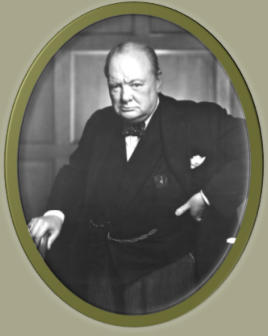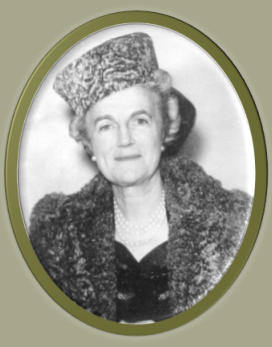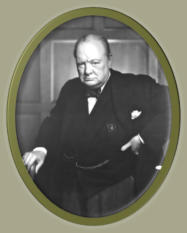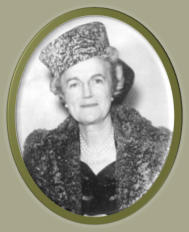Churchill and His Critic
A
story,
perhaps
apocryphal
or
embellished,
has
long
been
told
of
an
intoxicated
Winston
Churchill,
the
British
WWII
prime
minister,
being
confronted
by
a
woman
at
a
dinner
party.
“Sir
Winston,”
she
exclaimed,
“you’re
drunk!”
Churchill
retorted,
“That
may
be
so,
madame;
but
you’re
ugly, and tomorrow morning, I’ll be sober.”
It
is
hard
to
suppress
amusement
at
such
repartee,
but
perhaps
some
more
sobering
thoughts
are
in
order.
First,
while
there
might
be
something
to
admire
in
Churchill’s
quick
and
nimble
wit,
truth
and
falsehood
remain
what
they
are
regardless
of
how
effectively
(or
ineffectively)
they
are
packaged
and
presented.
Satan
is
ingenious
at
devising
ways
to
obscure
the
truth
or
distract
people
from
it.
For
instance,
some
people
seem
to
think
that
shouting
is
a
good
argument.
Of
course,
falsehood
shouted
is
no
truer
than
falsehood
whispered.
Likewise,
humor
can
be
an
effective
tool
in
the
devil’s
hands
to
mask
sin.
Error
seems
so
much
less
threatening,
even
downright innocent, if he can couch it in a way that brings laughter.
For
instance,
the
reader
can
get
so
caught
up
in
the
humor
of
Churchill’s
response
to
his
critic
that
it
requires
a
conscious
effort
to
think
about
it
beyond
that.
It
is
told,
and
intended,
as
a
joke!
It
is
practically
counterintuitive
to
see
it
otherwise.
To
analyze
it
for
anything
else
just
spoils
the fun.
Yet,
a
little
more
reflection
might
prompt
the
reader
to
ask,
“What
did
he
really
say
to
her???”
He
managed
to
respond
with
an
insult
so
witty
and
cutting
that
nobody
cares
if
he
was
drunk
or
the
woman
was
not
really
ugly!
He
was
so
hilarious
that
it
does
not
even
occur
to
the
reader
that
he
insulted
her!
No,
Winston
Churchill
got
caught
shamelessly
drunk,
and
all
he
could
think
to
do
was
deflect
his
critic
with
the
insult
that
she
was
incurably
ugly!
Second,
casting
blame
on
others
is
rarely,
if
ever,
an
appropriate
response
to
criticism.
Peter
said
not
to
return
“…
insult
for
insult”
(1
Pet.
3:9).
Whether
the
woman
was
really
ugly
or
not,
Churchill’s
riposte
surely
shut
her
down.
Yet,
none
of
that
changed
the
fact
that
she
was
right
that
Churchill
was
drunk!
Nevertheless,
this
is
often
the
way
sinners
respond
when
they
are
caught.
The
“golden
rule”
among
wrongdoers,
rarely
violated,
is:
“do
or
say
anything
but
admit
you
are
wrong.
Lie
about
it,
minimize
it,
shift
the
issue,
offer
excuses,
pass
the
criticism
off
with
a
joke,
find
fault
with
your
critic
—
but,
whatever
you
do,
don’t
admit
you’re
wrong.”
There
is
only one thing worse than sin to the sinner, and that’s admitting it.
It
is
characteristic
for
sinners,
if
they
cannot
escape
blame,
to
find
some
way
to
share,
or
shift,
the
blame.
It
is
a
school
yard
ploy
to
say,
“He
did
it,
too,”
but
one
which
adults
find
hard
to
outgrow.
Churchill
could
not
deny
he
was
drunk,
but
he
did
something
else
so
effective
that,
to
his
critic
and
everybody
there
and
since
then,
he
might
as
well
not
have
been
drunk.
It
is
hard
to
imagine
a
meaner,
harsher
thing
to
say
to
a
woman.
Whether
his
critic’s
face
was
ugly
is
not
certain,
but
it
is
certain
that
his
own
spirit
was.
She
may
not
have
been
pretty,
but
neither
was
he
really
half
as
“cute”
as
he
thought
he
was.
“Charm
is
deceitful
and
beauty
is
vain,
but
a
woman
who
fears the Lord, she shall be praised” (Prov. 31:30).
Churchill
was
probably
sober
the
next
morning,
and
the
woman,
if
ugly
was
still
so.
But
the
“sober
truth”
for
Churchill
was
that
ugliness
is
not
a
sin;
drunkenness
is!
A
person
can
be
ugly
and
still
go
to
heaven,
but
he
will
never
get
there
drunk
(1
Cor.
6:9-11).
Churchill
might
have
regained
his
sobriety
in
the
morning,
but
not
his
character.
He
was
still
a
sinner,
an
“ugly
truth”
hardly
relieved
by
his
sobriety,
and
that
was
true,
whether
the
woman
was
ugly or not!
“Like
a
madman
who
throws
firebrands,
arrows
and
death,
so
is
the
man
who deceives his
neighbor, and says, ‘Was I not joking?’” (Proverbs 26:18,19).
Winston Churchill
(1941)
Clementine Churchill


Winston Churchill/1941/Creative Commons Attribution 2.0 Generic license/Yousuf Karsh, Library and Archives Canada, e010751643
Clementine
Churchill/May
30,
1941/Creative
Commons
Attribution-NonCommercial-ShareAlike
4.0
International
License/Dennis
M.
Ogawa
Nippu
Jiji
Photograph Collection/Nippu Jiji Photograph Archive, "Gaijin" Collection

Copyright © 2017 - current year, Gary P. and Leslie G. Eubanks. All Rights Reserved.
Churchill and His Critic
A
story,
perhaps
apocryphal
or
embellished,
has
long
been
told
of
an
intoxicated
Winston
Churchill,
the
British
WWII
prime
minister,
being
confronted
by
a
woman
at
a
dinner
party.
“Sir
Winston,”
she
exclaimed,
“you’re
drunk!”
Churchill
retorted,
“That
may
be
so,
madame;
but
you’re
ugly,
and
tomorrow
morning, I’ll be sober.”
It
is
hard
to
suppress
amusement
at
such
repartee,
but
perhaps
some
more
sobering
thoughts
are
in
order.
First,
while
there
might
be
something
to
admire
in
Churchill’s
quick
and
nimble
wit,
truth
and
falsehood
remain
what
they
are
regardless
of
how
effectively
(or
ineffectively)
they
are
packaged
and
presented.
Satan
is
ingenious
at
devising
ways
to
obscure
the
truth
or
distract
people
from
it.
For
instance,
some
people
seem
to
think
that
shouting
is
a
good
argument.
Of
course,
falsehood
shouted
is
no
truer
than
falsehood
whispered.
Likewise,
humor
can
be
an
effective
tool
in
the
devil’s
hands
to
mask
sin.
Error
seems
so
much
less
threatening,
even
downright
innocent, if he can couch it in a way that brings laughter.
For
instance,
the
reader
can
get
so
caught
up
in
the
humor
of
Churchill’s
response
to
his
critic
that
it
requires
a
conscious
effort
to
think
about
it
beyond
that.
It
is
told,
and
intended,
as
a
joke!
It
is
practically
counterintuitive
to
see
it
otherwise. To analyze it for anything else just spoils the fun.
Yet,
a
little
more
reflection
might
prompt
the
reader
to
ask,
“What
did
he
really
say
to
her???”
He
managed
to
respond
with
an
insult
so
witty
and
cutting
that
nobody
cares
if
he
was
drunk
or
the
woman
was
not
really
ugly!
He
was
so
hilarious
that
it
does
not
even
occur
to
the
reader
that
he
insulted
her!
No,
Winston
Churchill
got
caught
shamelessly
drunk,
and
all
he
could
think
to
do
was
deflect
his
critic
with
the
insult that she was incurably ugly!
Second,
casting
blame
on
others
is
rarely,
if
ever,
an
appropriate
response
to
criticism.
Peter
said
not
to
return
“…
insult
for
insult”
(1
Pet.
3:9).
Whether
the
woman
was
really
ugly
or
not,
Churchill’s
riposte
surely
shut
her
down.
Yet,
none
of
that
changed
the
fact
that
she
was
right
that
Churchill
was
drunk!
Nevertheless,
this
is
often
the
way
sinners
respond
when
they
are
caught.
The
“golden
rule”
among
wrongdoers,
rarely
violated,
is:
“do
or
say
anything
but
admit
you
are
wrong.
Lie
about
it,
minimize
it,
shift
the
issue,
offer
excuses,
pass
the
criticism
off
with
a
joke,
find
fault
with
your
critic
—
but,
whatever
you
do,
don’t
admit
you’re
wrong.”
There
is
only
one
thing worse than sin to the sinner, and that’s admitting it.
It
is
characteristic
for
sinners,
if
they
cannot
escape
blame,
to
find
some
way
to
share,
or
shift,
the
blame.
It
is
a
school
yard
ploy
to
say,
“He
did
it,
too,”
but
one
which
adults
find
hard
to
outgrow.
Churchill
could
not
deny
he
was
drunk,
but
he
did
something
else
so
effective
that,
to
his
critic
and
everybody
there
and
since
then,
he
might
as
well
not
have
been
drunk.
It
is
hard
to
imagine
a
meaner,
harsher
thing
to
say
to
a
woman.
Whether
his
critic’s
face
was
ugly
is
not
certain,
but
it
is
certain
that
his
own
spirit
was.
She
may
not
have
been
pretty,
but
neither
was
he
really
half
as
“cute”
as
he
thought
he
was.
“Charm
is
deceitful
and
beauty
is
vain,
but
a
woman
who
fears
the Lord, she shall be praised” (Prov. 31:30).
Churchill
was
probably
sober
the
next
morning,
and
the
woman,
if
ugly
was
still
so.
But
the
“sober
truth”
for
Churchill
was
that
ugliness
is
not
a
sin;
drunkenness
is!
A
person
can
be
ugly
and
still
go
to
heaven,
but
he
will
never
get
there
drunk
(1
Cor.
6:9-11).
Churchill
might
have
regained
his
sobriety
in
the
morning,
but
not
his
character.
He
was
still
a
sinner,
an
“ugly
truth”
hardly
relieved
by
his
sobriety,
and
that
was
true,
whether the woman was ugly or not!
“Like
a
madman
who
throws
firebrands,
arrows
and
death,
so
is
the
man
who
deceives
his
neighbor,
and
says,
‘Was
I
not
joking?’” (Proverbs 26:18,19).


Winston Churchill
(1941)
Clementine Churchill
Winston
Churchill/1941/Creative
Commons
Attribution
2.0
Generic
license/Yousuf
Karsh,
Library
and
Archives Canada, e010751643
Clementine
Churchill/May
30,
1941/Creative
Commons
Attribution-NonCommercial-ShareAlike
4.0
International
License/Dennis
M.
Ogawa
Nippu
Jiji
Photograph
Collection/Nippu
Jiji
Photograph
Archive, "Gaijin" Collection

Copyright © 2017 - current year, Gary P. and Leslie G. Eubanks. All Rights Reserved.











